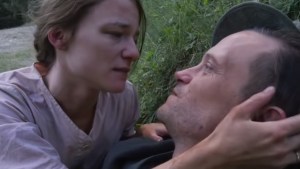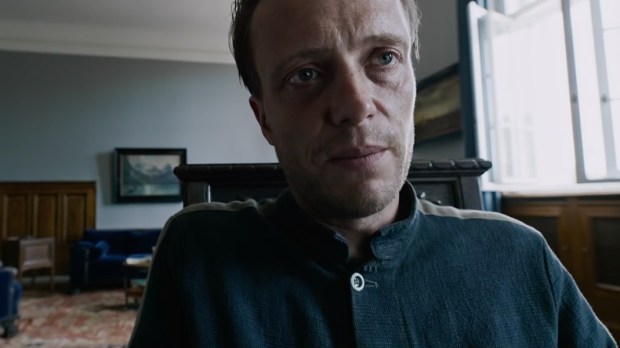Terrence Malick’s new film, A Hidden Life, out in theaters this month, is based on the true story of Blessed Franz Jagerstatter, an Austrian farmer and married father of three who was conscripted as a soldier into the German army in 1943. Even though the horrors of the Nazi prison camps hadn’t yet been revealed, he was quite sure the war was wrong. Even worse, every soldier in the army was required to take an oath of loyalty to Hitler. Franz was willing to find some way to serve in the army if he had to, perhaps as a hospital orderly, but was absolutely decided that he would not swear personal allegiance to Hitler. In the film, while men line up to his left and right before the commanding officer, raise their right hands, and make the oath, Franz stands with both arms at his side, lips unmoving. He will not betray his inner convictions. For his courage, he’s thrown into prison and eventually executed.
After viewing the film, I sat through the credits deep in thought. I’m independent-minded and self-confident to a fault, but would I have been as principled as Franz ? How is it that I react to peer pressure? Looking back, it’s easy to claim I would have acted as Franz did, that everyone knew Hitler was evil and no one with an ounce of moral fiber would have cooperated with him.
Here’s what bothered me, though, as I sat in that dark theater at the end of the movie: I’m pretty sure I would have taken the oath. I would have somehow convinced myself it was justifiable, that I was doing it for my family, that it’s okay to lie to evil men, that I was being forced to do it and it wasn’t my fault. In Franz’s village of St. Radegund, every other man took the oath and fought for the Nazis. His neighbors weren’t bad men, they were only trying to survive, but their complicity left Franz isolated and alone.
In Malick’s film, as Franz debates whether he’s going to take the oath or not, he’s subjected to peer pressure from every direction. His friends tell him that he will be executed and leave his children orphaned — he’s abandoning his family, they say. The mayor aggressively argues that he’s shaming the entire village. Friends and neighbors turn on him, mock him, and shun him. In prison, he’s repeatedly interrogated and pressured to change his mind. He’s told that his moral stance is meaningless, that he is going to lose his life for nothing, and that all he needs to do is take the oath and say a few insignificant words to be set free. Even his own lawyer who defends him in the military trial tries to force him to change his mind.
I’m sure all this pressure took a great toll on Franz. Peer pressure doesn’t only work on schoolchildren; adults are influenced by it every day.There’s pressure to have a marriage that looks perfect, a house worthy of a magazine spread, a successful career. There’s pressure to never question social norms, to go with the flow and not cause a fuss. Anyone who votes for the wrong politician or expresses an opinion that is old-fashioned — even if it’s something we all believed a few years ago — might be shunned or mocked.
This can take place in all sorts of small ways. In my own life, for instance, I don’t eat meat on Fridays since it’s still the normative penitential practice on Fridays for Catholics. Even this causes subtle peer pressure because I have to choose specific restaurants if I’m meeting a friend on a Friday, and I occasionally arrive at a Friday night dinner party only to be served food that I feel rude not to eat.
I’m also a father of six and there is parental peer pressure from all corners. The kids aren’t in enough sports, they don’t have the right clothes and the newest electronics, they’re too restricted in what movies they can watch and who they can play with … it goes on and on. The peer pressure is often unintentional and implicit, but it very much exists and is a powerful influence on our decisions.
How can we resist?
First, we need to aware of how peer pressure is affecting us. Are we being unduly influenced by others to the point that we’re being false to our own conscience? This can easily happen because there are actually two factors in decision-making: a rational process by which we logically think through our decisions, and an emotional component that is directly connected to our sense of well-being. Basically, when we make a decision that helps us fit in with a group, our brains release a chemical called dopamine that makes us feel calm. This is particularly strong in teen brains, but it affects adults, too. It provides strong motivation to make a decision simply because it feels good.
How many times do we make up our minds to to do something only to be immediately swayed by someone else to do the exact opposite? We must understand how peer pressure works on our brains and develop a strong sense of self-worth and trust ourselves. Franz Jagerstatter took time to think about his decision. He knew it was right and refused to let anyone talk him out of it. He wasn’t close-minded and obstinate about it; he discussed his decision with his wife, for instance, but never allowed the emotional desire to fit in to overcome his reason and his commitment to do what he knew was right.
We’re all subject to peer pressure and there’s no escaping it (although it may be advisable to cut the worst offenders from our daily interactions). The world is a wonderful place, and the diversity of our opinions, the way we influence and teach each other, can be really beautiful. I don’t think any of us would want to be totally isolated. But living in society means that we will encounter peer pressure. Blessed Franz Jagerstatter shows us how we can stand up to it.
In the end, Franz died a martyr’s death, but contrary to what everyone told him, he was not forgotten. He has not only been beatified by the Church — an important step in being canonized a saint — but a film was just made about him by one of the most talented directors of our time.
So it turns out that doing the right thing, being true to yourself, and guarding your personal integrity, are highly winsome qualities. Those who resist peer pressure, it seems, are the people who change the world.

Read more:
17 Classic baby names inspired by saints who witnessed to God’s mercy

Read more:
Director Terrence Malick’s ‘A Hidden Life’ focuses on a Catholic hero

